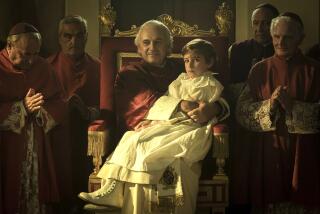Review: Patrick Modiano’s ‘Suspended Sentences’: Mysteries of existential sort
When Patrick Modiano won the Nobel Prize for literature in October, a lot of readers (myself included) were taken by surprise. Until now, he has been relatively unknown in the U.S., although he is a bestseller in his native France and winner of the Prix Goncourt who has published steadily since his first novel, “La Place de l’Étoile,” appeared in 1968, and co-wrote the screenplay for Louis Malle’s 1974 movie “Lacombe Lucien.”
Like that film, much of Modiano’s fiction has roots in the paradoxes of the Vichy era, which remains, for him, a matter of both personal and collective history. Born in 1945, he grew up estranged from his father, a black marketeer, and has called himself “a product of the dunghill of the Occupation, that bizarre time when people who should have never met did meet and by chance produced a child.”
Such tensions are very much at work in “Suspended Sentences,” a book that gathers three novellas originally published between 1988 and 1993 and now available in English for the first time. “I thought I’d written them discontinuously, in successive bouts of forgetfulness,” Modiano has said of these efforts, “but often the same faces, the same names, the same places, the same sentences recur from one to the other.” All three take place in a distant Paris, a city not of the imagination so much as of their narrators’ memories.
“I’m racking my brains to remember as many details as I can,” Modiano writes in “Flowers of Ruin,” the third novella in the collection. “… It was at 19 Boulevard Raspail. In 1965. A grand piano at the very back of the room. The sofa and the two armchairs were made of the same black leather. The coffee table of chrome-plated metal. A name like Devez or Duvelz. The scar on the cheek. The unbuttoned blouse. A very bright light as if from a projector, or rather a flashlight. It lights only a portion of the scene, an isolated instant, leaving the rest in shadow. We will never know what happened next or who those two people really were.”
What such a passage offers is an accumulation of details, but they are details that never quite add up. This edge of mystery, of indirection, motivates all three of the works here like an animating force.
In “Afterimage,” a young man, 19, meets a photographer named Francis Jansen and volunteers to catalog his archives, which are kept in three brown leather suitcases in his studio. The title novella revolves around two young boys, the narrator and his younger brother, who come to live with a family friend in a Paris suburb after their mother, an actress, “had gone on the road for a play.” “Flowers of Ruin” recalls the story of a murder-suicide … or does it? The resolution is left unclear. Here, the narrator is an adult looking back at a youth not so much misspent as adrift. He is fascinated by news accounts of the case, in which a husband and wife met some unknown parties at a nightclub, then returned home to kill themselves.
What led them to such a decision? And are there echoes that connect to the narrator’s life? That none of these questions are ever really answered is both the challenge and the thrill of the work. Like Albert Camus or (perhaps more appropriately) Paul Auster, Modiano is most interested in the asking, in the rabbit holes of memory and conjecture, which envelop us no matter what we do or do not learn.
In that sense, the three novellas that make up this exquisite collection are mysteries, albeit mysteries of an existential sort. Modiano’s characters are engaged in an investigation of consciousness, or identity, which grows more essential the more disconnected they become.
For the boy narrator of “Suspended Sentences,” this means trying to piece together what the adults around him are doing, even as their lives unfold, primarily, beyond his view. “Annie, Little Hélène, and Roger Vincent had certainly wound up in jail,” he tells us, “I had lost my brother. The thread had snapped — a gossamer strand. There was nothing left of all that …”
Certainly, there are elements of autobiography; Modiano did lose his younger brother, and his father flickers through these stories like a ghost. But even more essential is the revelation that autobiography will not preserve us, that the self is as constructed as any fiction, especially after the recollections on which it depends begin to disappear.
“The other day,” he writes, recalling a long forgotten character, “I was leafing through an old back issue of ‘La Semaine à Paris’ from July 1939. … I was surprised to come across a tiny photo of Frede. … I bought this program, the way you buy a piece of evidence, some tangible proof that it wasn’t all in your head.”
Partly, such a process is physical; Modiano may be at his finest evoking the lost corners of Paris, imbuing the landscape of the city with a palpable weight of loss. Yet even more, it is emotional, psychological, an expression of the way that, if we live long enough, our histories begin to seem invented — not as if they happened to someone else but as if they might not have taken place at all.
All this gives “Suspended Sentences” a vivid air of the conditional, which is, of course, the whole idea. For Modiano, memory, experience are fluid, fleeting, and even the stories we tell ourselves are subject to change. Our lives flicker past us like the afterimage of a photo; eventually, our attempts at constancy must fall away.
“The efforts I’d made for thirty years to have a trade,” he writes, “give my life some coherence, try to speak and write a language as best I could so as to be certain of my nationality — all that tension suddenly released. It was over. I was nothing now. Soon I would slip out of this park toward a metro stop, then a train station and a port. When the gates closed, all that would remain of me would be the raincoat I’d been wearing, rolled into a ball on a bench.”
Suspended Sentences
Three Novellas
Patrick Modiano
Translated from the French by Mark Polizzotti
Yale University Press: 214 pp., $16 paper
More to Read
Sign up for our Book Club newsletter
Get the latest news, events and more from the Los Angeles Times Book Club, and help us get L.A. reading and talking.
You may occasionally receive promotional content from the Los Angeles Times.








